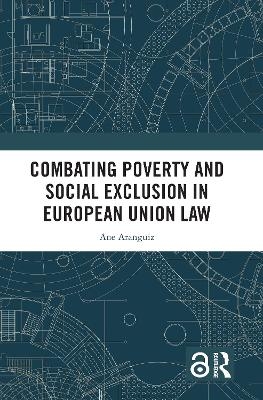
Combating Poverty and Social Exclusion in European Union Law
Routledge (Verlag)
978-1-032-11911-3 (ISBN)
Anti-poverty strategies have been part of the European Union agenda for decades. Most saliently, over a decade ago, the EU’s Member States pledged to lift 20 million people out of poverty. In spite of this commitment, the EU did not even meet a quarter of this target, and over 113 million people still were at risk of poverty and social exclusion by the end of 2020. This book addresses the incongruence between a quite developed EU policy strategy and a well-embedded legal objective on the one hand, and the lack of direct legal action on the other. Analysing the role of social policy instruments, fundamental rights, and the constitutional framework of the European Union, it makes a detailed case for a contribution of EU law to the policy objective of combating poverty and social exclusion.
Drawing on work in law, politics, social policy and economics, this book will interest scholars and policymakers in the areas of EU law, labour and social security, human rights, political science and social and public policy.
The Open Access version of this book, available at www.taylorfrancis.com, has been made available under a Creative Commons Attribution (CC-BY) 4.0 license.
Ane Aranguiz is a Postdoctoral Researcher at the Private, Business and Labour Law department of Tilburg University and the Government and Law research group of the University of Antwerp.
Chapter 1: Introduction
1. Setting and background
2. Aim and outline of the book
3. Poverty and social exclusion in the EU
3.1. Conceptual clarifications
3.2. State of play: the data
Chapter 2: The EU Social Policy Context
1. Introduction
2. The Social OMC
2.1. The origins and key features of the Social OMC
2.2. The Social OMC within Europe 2020
2.3. Assessment
3. Europe 2020 and the European Semester
3.1. General architecture of Europe 2020
3.2. The European Semester
3.3. Assessment
4. The Action Plan to implement the EPSR
4.1. Content
4.2. Preliminary assessment
5. Financial resources
6. Conclusions
Chapter 3: The EU Fundamental Social Rights Landscape
1. Introduction
2. The intricate fundamental rights landscape in EU law
2.1. General principles and the CFREU
2.2. Balancing fundamental rights against fundamental freedoms
2.3. Interactions with international sources of social rights
2.4. Intermediate conclusions
3. The European Pillar of Social Rights: a game changer?
3.1. Background and content
3.2. Implementation and added value
4. Substantive rights
4.1. Human dignity
4.2. The right to social security
4.3. The right to social assistance
4.4. The right to fair remuneration
4.5. Intermediate conclusions
5. Conclusions
Chapter 4: The EU Constitutional Framework
1. Introduction
2. The objective of combating poverty and social exclusion in EU primary law
2.1. Values of the EU: Article 2 TEU
2.2. General objectives of the EU: Article 3 TEU
2.3. The ‘untapped’ horizontal social clause: Article 9 TFEU
2.4. The social policy objective: Article 151 TFEU
3. Conferral, subsidiarity and proportionality
3.1. Conferral
3.2. Subsidiarity
3.3. Proportionality
4. Social competences
4.1. Social policy competences: Article 153 TFEU
4.2. Alternative bases and the interesting case of social cohesion: Article 175 TFEU
4.3. General legal basis
5. General remarks on EU competences
6. Conclusion: Limited, yet existing
Chapter 5: Implementing the Objective of Combating Poverty and Social Exclusion Under EU Law
1. Introduction
2. Rationale
2.1. Why act at the EU level?
2.2. Why these instruments?
2.3. Why instrumentalise the EPSR?
3. General remarks
3.1. Adequacy
3.2. Coverage
3.3. Take-up
4. A Framework Directive on Minimum Income (Principle 14)
4.1. Context of the proposal
4.2. Legal basis, subsidiarity and proportionality
4.3. Content of the proposal
5. A Framework Directive on Minimum Wages (Principle 6)
5.1. Context of the proposal
5.2. Legal basis, subsidiarity and proportionality
5.3. Content of the proposal
6. A Framework Directive on Access to Social Protection (Principle 12)
6.1. Context of the proposal
6.2. The Recommendation
6.3. The next step: A Framework Directive
7. A European Unemployment Benefit Scheme (Principle 13)
7.1. Context of the proposal
7.2. Potential EUBS design(s)
7.3. Legal bases: A Directive on Minimum Requirements on Unemployment Benefits
7.4 Concluding remarks
8. Other alternatives
9. Conclusions
Chapter 6: General Conclusions
1. Introduction
2. The EU Social Policy Context
3. The EU Fundamental Social Rights Landscape
4. The EU Constitutional Framework
5. Implementing the Objective of Combating Poverty and Social Exclusion Under EU Law
6. Concluding remarks
| Erscheinungsdatum | 19.04.2022 |
|---|---|
| Verlagsort | London |
| Sprache | englisch |
| Maße | 156 x 234 mm |
| Gewicht | 453 g |
| Themenwelt | Naturwissenschaften ► Geowissenschaften ► Geografie / Kartografie |
| Recht / Steuern ► Allgemeines / Lexika | |
| Recht / Steuern ► Arbeits- / Sozialrecht ► Arbeitsrecht | |
| Recht / Steuern ► EU / Internationales Recht | |
| Recht / Steuern ► Öffentliches Recht ► Verfassungsrecht | |
| Recht / Steuern ► Öffentliches Recht ► Völkerrecht | |
| Wirtschaft ► Volkswirtschaftslehre ► Makroökonomie | |
| Wirtschaft ► Volkswirtschaftslehre ► Wirtschaftspolitik | |
| ISBN-10 | 1-032-11911-X / 103211911X |
| ISBN-13 | 978-1-032-11911-3 / 9781032119113 |
| Zustand | Neuware |
| Informationen gemäß Produktsicherheitsverordnung (GPSR) | |
| Haben Sie eine Frage zum Produkt? |
aus dem Bereich


